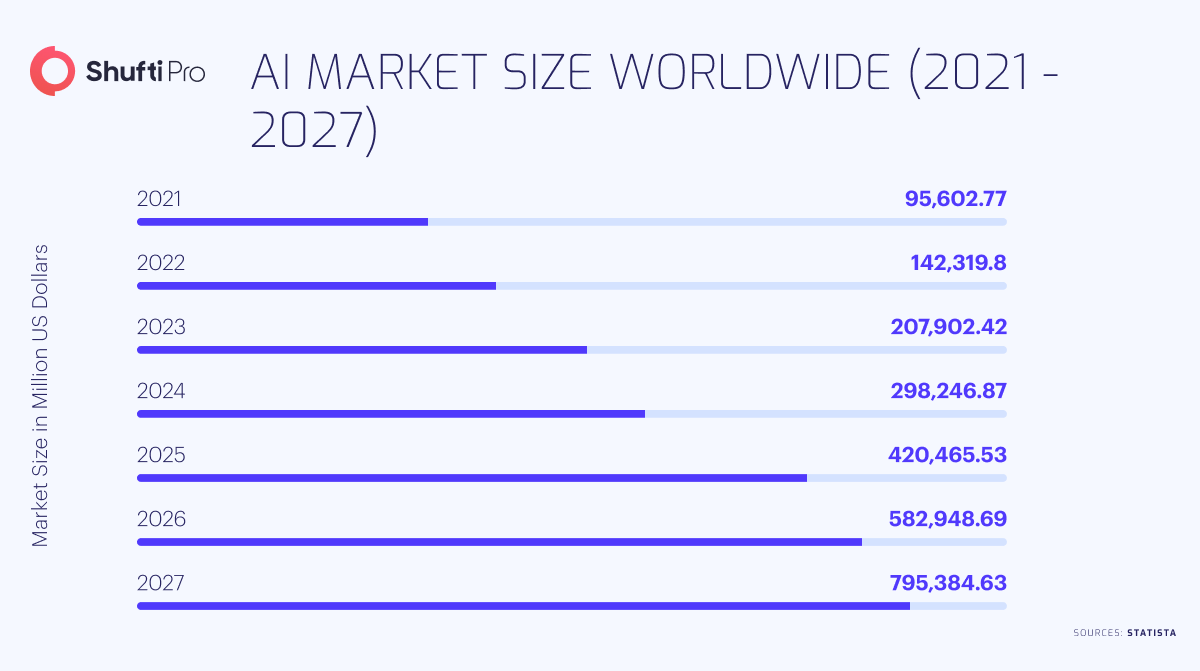4 WAYS AI is Shaping KYC and AML Compliance for Businesses

The role of Artificial Intelligence (AI) is rapidly increasing in businesses and the emergence of ChatGPT has caused deep ripples within the sector. The AI market was valued at $95,603 million in 2021 and is expected to reach $795,385 million by 2027. As maintaining KYC and AML compliance continues to be a challenge for companies, the ability to automate the process offers many perks to companies.

What Does AI Bring to the KYC and AML Table?
Today, Know Your Customer and Anti Money Laundering (KYC/AML) compliance has become data-heavy for the financial sector as it is expanding its customer base. This is where AI comes to the rescue.
1. Improved Data Management
No matter if it is a financial sector or any other industry, it’s guaranteed that there are huge piles of data to be managed. Using AI technology, compliance officers can bring all that information together. Patterns that were almost impossible to see become clear now.
Bringing together all the data and then sorting through it using AI technology can indicate where people struggle and, most importantly the reason behind their struggles. The capability to add context to human-generated details differentiates data points from behavioural data, which facilitates improving the compliance process. For instance, identifying common patterns that appear in the disclosure reports consistently is more important than just realising their presence.
The use of behavioural data is prevalent, but its implementation is more likely to increase in 2023 and beyond. No matter what the size of your business is, investing in AI-powered KYC and AML solutions would improve data management and help the company save money and time.
2. Reduce Human Error
Asset management is prone to human errors due to its highly complex nature and the errors are usually costly, charging the sector billions of dollars annually. Although it is tough to eliminate human error, increased use of AI and machine learning technology can aid in minimising it.
As compliance officers who work in the financial sector are required to manage huge volumes of data related to everything from customer transactions to business operations. Such huge data is impossible for any human to review on their own, making the use of capable technology like AI an absolute necessity. The more the data, the greater the chances of a human making a mistake. However, such errors can be minimised with AI because the more data this technology is fed with, the more it learns and the better it becomes.
3. Minimise False Positives
Dealing with false positives is one of the most time-taking aspects of KYC and AML compliance. The rate of false positives is exponentially high using rule-based alert systems because they have a single rule for all situations and do not take into account different contexts. Moreover, a compliance officer has to review every alert that teh system generates. This is a waste of resources, as the compliance officer’s energy and time are redirected from other duties to respond to the alert. Not only this but the unnecessary involvement of a compliance officer increases the chance of human error is a major challenge faced by regulated sectors like finance.
Email review is one of the excellent applications of AI that enhances the effectiveness of compliance. Rule-based alert systems scam emails for specific keywords and generate many alarms for false positives to be reviewed by the compliance officer. However, AI-powered systems learn and adapt with time and generate fewer false alerts.
4. Prevents Fraud and Money Laundering
Artificial intelligence has become highly effective in detecting any kind of fraud. The technology can detect unique data points in different situations instead of applying the same rules to all scenarios. For example, a bank notifies cardholders when they detect any suspicious transaction or fraudulent activity on their cards. AI has enhanced fraud detection solutions as it can identify any kind of fraudulent activities such as money laundering and other heinous crimes with greater accuracy. The reason why it is revolutionising KYC and AML solutions is that it is learning continuously with more data given to it, becoming better at detecting anomalies.
With the advancement in technology, scammers are becoming smarter to commit fraud. They are using sophisticated strategies to perpetrate white-collar crimes such as money laundering and fulfil their illicit intents. For instance, AML policy requires transactions exceeding $10,000 to sanctioned jurisdictions to be analysed and reported. However, criminals are becoming aware of this policy and what they do is that they keep transactions below the $10,000 mark to avoid being detected.
Artificial intelligence technology used in KYC and AML solutions can mitigate the risk of money laundering as it learns and updates its search criteria to stay ahead of tactics. Rather than probing transactions of a certain amount, it screens multiple transactions. This is how AI generates alerts for potentially fraudulent transactions even when they are below the said mark and helps deter money laundering and other crimes.
How Can Shufti Help?
AI and ML (Machine Learning) are becoming the new normal in businesses. It’s not only the major players who can benefit from it but companies of any size can use AI to enhance their compliance programs. This is where Shufti fits in the puzzle. Shufti offers AI-powered KYC and AML solutions to mitigate the risk of fraudulent activities and prevent firms from hefty non-compliance fines.
Still confused about how Shufti helps financial firms automate KYC and AML compliance?

 Explore Now
Explore Now













